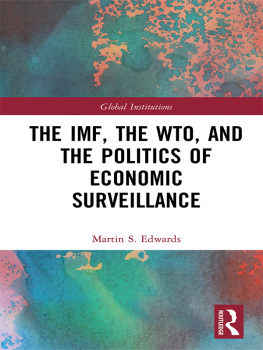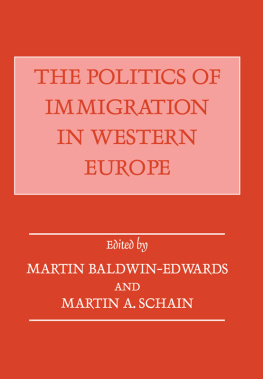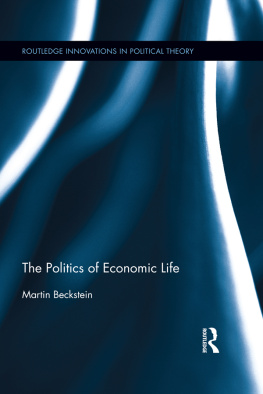The IMF, the WTO, and the Politics of Economic Surveillance
Both the International Monetary Fund (IMF) and the World Trade Organization (WTO) practice periodic surveillance of members to ensure that countries are adopting appropriate economic policies. Despite the importance of these procedures, they remain understudied by scholars. The global economic crisis has tested both organizations and brought surveillance to the forefront of policy debates. Understanding how surveillance works, then, contributes to both theoretical and policy concerns.
The world is paying increasing attention to issues of transparency and accountability, questioning whether these organizations are in part responsible for the global economic crisis, as well as assessing their responsiveness to the crisis. This comparative analysis of surveillance at the IMF and WTO fills a significant gap in the existing literature, drawing together a large range of empirical data and offering an extended critical analysis of this key issue.
Examining how and in what contexts surveillance is influential and how variations in institutional design shape the effectiveness of surveillance, Edwards moves on to offer recommendations of how surveillance can be designed differently to make it more effective in the future. This work will be of great interest to students and scholars of international organizations, international political economy and global governance.
Martin S. Edwards is an Associate Professor in the School of Diplomacy and International Relations at Seton Hall University in South Orange, New Jersey, where he teaches classes on International Organizations and Research Methods. His research on the International Monetary Fund has been supported by the National Science Foundation, and he has been a Fulbright Visiting Research Chair in Global Governance at the Balsillie School of International Affairs. Recent articles have appeared in SAIS Review, International Studies Perspectives, Review of International Organizations, Political Research Quarterly, and Review of International Political Economy. His policy commentary has appeared in the Washington Post, Foreign Policy, Open Democracy, the World Policy Journal Blog, The Hill, The Conversation, World Politics Review, and Foreign Policy in Focus. He has been a university nominee for the Carnegie/CASE US Professor of the Year.
Routledge Global Institutions Series
Edited by Thomas G. Weiss
The CUNY Graduate Center, New York, USA
and Rorden Wilkinson
University of Sussex, Brighton, UK
About the series
The Global Institutions Series provides cutting-edge books about many aspects of what we know as global governance. It emerges from our shared frustrations with the state of available knowledgeelectronic and print-wise, for research and teachingin the area. The series is designed as a resource for those interested in exploring issues of international organization and global governance. And since the first volumes appeared in 2005, we have taken significant strides toward filling conceptual gaps.
The series consists of three related streams distinguished by their blue, red, and green covers. The blue volumes, comprising themajority of the books in the series, provide userfriendly and short (usually no more than 50,000 words) but authoritative guides to major global and regional organizations, as well as key issues in the global governance of security, the environment, human rights, poverty, and humanitarian action among others. The books with red covers are designed to present original research and serve as extended and more specialized treatments of issues pertinent for advancing understanding about global governance. And the volumes with green coversthe most recent departure in the seriesare comprehensive and accessible accounts of the major theoretical approaches to global governance and international organization.
The books in each of the streams are written by experts in the field, ranging from the most senior and respected authors to first-rate scholars at the beginning of their careers. In combination, the three components of the seriesblue, red, and greenserve as key resources for faculty, students, and practitioners alike. The works in the blue and green streams have value as core and complementary readings in courses on, among other things, international organization, global governance, international law, international relations, and international political economy; the red volumes allow further reflection and investigation in these and related areas.
The books in the series also provide a segue to the foundation volume that offers the most comprehensive textbook treatment available dealing with all the major issues, approaches, institutions, and actors in contemporary global governanceour edited work International Organization and Global Governance (2014)a volume to which many of the authors in the series have contributed essays.
Understanding global governancepast, present, and futureis far from a finished journey. The books in this series nonetheless represent significant steps toward a better way of conceiving contemporary problems and issues as well as, hopefully, doing something to improve world order. We value the feedback from our readers and their role in helping shape the on-going development of the series.
A complete list of titles can be viewed online here: https://www.routledge.com/Global-Institutions/book-series/GI.
First published 2019
by Routledge
2 Park Square, Milton Park, Abingdon, Oxon OX14 4RN
and by Routledge
52 Vanderbilt Avenue, New York, NY 10017
Routledge is an imprint of the Taylor & Francis Group, an informa business
2019 Martin S. Edwards
The right of Martin S. Edwards to be identified as author of this work has been asserted by him in accordance with sections 77 and 78 of the Copyright, Designs and Patents Act 1988.
All rights reserved. No part of this book may be reprinted or reproduced or utilised in any form or by any electronic, mechanical, or other means, now known or hereafter invented, including photocopying and recording, or in any information storage or retrieval system, without permission in writing from the publishers.
Trademark notice: Product or corporate names may be trademarks or registered trademarks, and are used only for identification and explanation without intent to infringe.
British Library Cataloguing in Publication Data
A catalogue record for this book is available from the British Library
Library of Congress Cataloging-in-Publication Data
A catalog record has been requested for this book
ISBN: 978-0-415-65816-4 (hbk)
ISBN: 978-0-429-02450-4 (ebk)
Writing a book can often be a lonely endeavor. I have been very lucky to have a great deal of help along the way. Some contributed their labor. I have been fortunate to have the help of an extremely talented cohort of graduate and undergraduate research assistants. To Andrew Berry, Kelsey Coolidge, Chandra DeNap, Cassie Denbow, Fred DeRitis, Yasmin Elkarrimy, Sajedeh Goudarzi, Lis Kabashi, Fadesola Ojeikere, Emily Pease McKenzie, Daria Preston, Andrew Richardson, Lori Rowen, and Stephanie Senger, each of you have my sincerest thanks for completing your tasks with flying colors, as well as putting up with my frequent and opaque emails.
Still others contributed money and time. I could not have completed this research without the generosity of the National Science Foundation and the Fulbright Foundation. The NSF provided me with a Research at Undergraduate Institutions award (Grant No. 0960422) to develop much of the research on the IMF, and the Fulbright Foundations Visiting Research Chair program gave me time and space to start writing the book. The Balsillie School of International Affairs and the Center for International Governance Innovation hosted me in Canada for a semester. Seton Hall University graciously offered me a sabbatical and provided Center of Excellence course releases when I really needed them. The School of Diplomacy graciously supported my frequent requests for research assistants, and Susan Malcolm cheerfully printed more versions of this manuscript than I can count.





